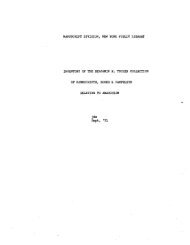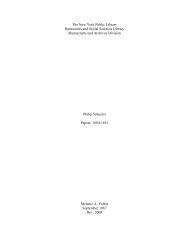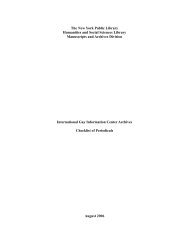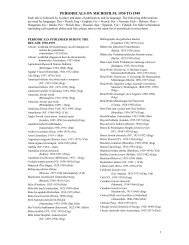pdf available - Multiple Choices
pdf available - Multiple Choices
pdf available - Multiple Choices
You also want an ePaper? Increase the reach of your titles
YUMPU automatically turns print PDFs into web optimized ePapers that Google loves.
LIFE, RECONSTRUCTION, AND CREATIVITY 137<br />
Kusnishtcher Street, and Polish Street. The Jews<br />
first settled at the center of the town square and<br />
alongside those four main streets. They built<br />
their homes, brought children into the world,<br />
and generation after generation contributed their<br />
share to the character of our small town, Luboml.<br />
No one determined a border to the streets<br />
where the Jews lived. Nevertheless, it is a fact that<br />
there was a certain spot on the line drawn by the<br />
designer, where Jewish life stopped and the life of<br />
Luboml's gentile citizens began. It just happened<br />
that the Jews lived in the center of town and<br />
gentiles' homes and fields surrounded the Jewish<br />
part of town like a belt.<br />
I remember the residents of our town being<br />
divided into different classes. There were scholars<br />
and those who were thirsty for knowledge, merchants<br />
and craftsmen, rich and poor, widows and<br />
orphans, lucky men and those who had run out of<br />
luck, fishermen and owners of carriages, water<br />
carriers and beggars.<br />
The life of our town was conducted in surprising<br />
harmony. There was acceptance of the<br />
laws and judgment from "above" without criticism<br />
concerning unfairness, that some were better<br />
off economically, or that property was not<br />
distributed equally.<br />
We children conducted our lives differently<br />
from the adults, according to our own set of rules.<br />
These rules were made by those boys who were<br />
physically superior.<br />
Our parents, however, did not divide themselves<br />
into groups as we did. They did not fight.<br />
They accepted their lot without thinking or protesting,<br />
at least not out loud. They argued about<br />
important world issues, about large wars. Nevertheless,<br />
they never spoke about their own wars,<br />
their struggle to survive from day to day. They<br />
accepted their economic standing as a decree from<br />
heaven or they blamed it on their personal failures.<br />
In their favor, it could be said that they were<br />
fair, proper, and decent. A man's economic standing<br />
did not affect his social standing. One's<br />
honesty and intelligence were his ticket to a<br />
favorable social standing. It is for this reason that<br />
I think highly of our town's citizens.<br />
I also remember our town's places of worship,<br />
many of which were shtiblach [small syna-<br />
gogues] belonging to Chasidim. There was also a<br />
bet midrash and the central synagogue.<br />
These places of worship were like a haven of<br />
refuge to most Jews of Luboml. Toward evening,<br />
after a long hard day of standing in the store, the<br />
Jew would come to the bet midrash to shake off<br />
the day's hardships. He would delve into a problem<br />
posed in the Talmud or listen to a lesson on<br />
Ein Yakov.<br />
In this manner he would lessen the worries<br />
on his mind, such as the fact that he had not paid<br />
for certain school lessons or that he did not have<br />
a proper dowry for his daughter who had come of<br />
age.<br />
Here in the shtibl and the bet midrash the<br />
ways of mutual aid, secret alms-giving, and sincere<br />
charity were permanently set. Those who<br />
were poor and forced to wander from town to<br />
town came to these places to request shelter when<br />
they passed through Luboml. There each person<br />
compared his life to the sorrow and hardships of<br />
others, and as a result his life seemed brighter. In<br />
the bet midrash and the shtibl men revealed the<br />
details of their worries and added them to all the<br />
worries of the community. Men were encouraged<br />
to let go of some of their problems and look forward<br />
to a new tomorrow.<br />
In the shtibel and Bet-Midrash, men tried to<br />
determine the future course of events in world<br />
politics, such as the time at which the next war<br />
would break out, etc. There was always one<br />
question that kept repeating itself: "Is this or that<br />
for the good of the Jewish people?"<br />
Our community was connected to the outside<br />
world through the post office, the railroad,<br />
and horse-drawn carriages. Letters and packages<br />
came in the mail, mostly from America, from<br />
relatives who had gone to try their luck across the<br />
Atlantic Ocean. In our imagination, all of them<br />
across the ocean were millionaires, eating like<br />
kings and dressing like princes.<br />
The receiving of packages was a major event,<br />
and in order to distribute the different presents<br />
among family members one needed the wisdom of<br />
Solomon. The packages also caused jealousy among<br />
neighbors who were not lucky enough to have<br />
relatives overseas. A telegram would, in most<br />
cases, bear bad news of a family disaster or<br />
tragedy. It was only on rare occasions that a







